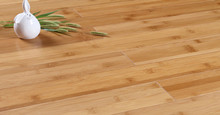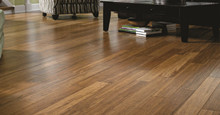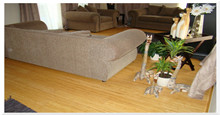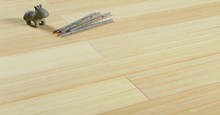Bamboo flooring has gained significant popularity in recent years, and for good reason. Its sleek, modern appearance, durability, and eco-friendly nature make it a favorite among homeowners and interior designers alike. But before you jump into installing bamboo flooring in your home, it is important to understand the costs involved. Like any home improvement project, the price of bamboo flooring installation can vary depending on several factors, such as the type of bamboo, the installation method, and location.
In this blog, we will break down the total cost of installing bamboo flooring, explore the factors that influence pricing, and provide insights from consumers who have already made the switch to bamboo. By the end, you will have a clear understanding of what to expect when budgeting for this stylish and sustainable flooring option.
1. The Average Cost of Bamboo Flooring Installation
On average, the cost to install bamboo flooring typically ranges between $5 to $10 per square foot, including both the cost of materials and labor. However, depending on a variety of factors, this price can fluctuate. Here is a closer look at how this price breaks down:
Materials: Bamboo flooring itself generally costs between $2 to $6 per square foot. The price largely depends on the type of bamboo you choose (strand-woven, vertical, or horizontal) and the quality of the product.
Labor: Installation labor costs typically range between $3 to $5 per square foot. This cost can be higher if you opt for a more complex installation method, such as glued-down or nailed-down flooring, as these methods are more labor-intensive.
Example Calculation:
For a 1,000-square-foot room, the total cost of installing bamboo flooring could range from $5,000 to $10,000. This estimate includes both the materials and labor for a standard installation.
2. Factors Impacting the Cost of Bamboo Flooring Installation
Like any renovation project, several variables can affect the final price of bamboo flooring installation. Here is a detailed breakdown of the major factors that contribute to the overall cost:
a. Type of Bamboo Flooring
There are three main types of bamboo flooring available, and each comes with its own price point:
Strand-Woven Bamboo: This is the most durable and often the most expensive option, priced between $3 to $6 per square foot. Strand-woven bamboo is made from shredded bamboo fibers that are compressed and bound together, making it harder and more durable than traditional bamboo flooring.
Horizontal Bamboo: This type of bamboo showcases a more natural, knotted look. It is a bit more affordable, costing around $2 to $4 per square foot.
Vertical Bamboo: Vertical bamboo is typically priced close to horizontal bamboo, ranging between $2 to $4 per square foot. It has a more uniform, clean appearance, which many homeowners prefer for a modern aesthetic.
b. Installation Method
The installation method you choose will play a large role in the overall price. There are three main installation methods:
Floating/Click-Lock: This is typically the most affordable option, as it is the easiest and fastest to install. You can expect to pay between $3 to $4 per square foot for labor.
Glue-Down Installation: This method is more labor-intensive and often costs between $4 to $6 per square foot for labor. Glue-down installation is ideal for concrete subfloors or high-traffic areas, but the additional adhesive and time required make it more expensive.
Nail-Down Installation: Nail-down is another labor-intensive method and can cost between $5 to $7 per square foot for labor. It is commonly used for wooden subfloors and provides a strong, long-lasting bond.
c. Subfloor Preparation
If your subfloor is not in perfect condition, you may need to invest in additional preparation work. For example, if the subfloor is uneven, it will need to be leveled before the bamboo flooring can be installed. This can add anywhere from $1 to $3 per square foot to your total installation cost.
d. Geographical Location
Where you live can also influence the cost of installation. Labor rates tend to be higher in urban areas or regions with a high cost of living. Additionally, if bamboo flooring is less common in your area, you may have to pay more for shipping and materials.
e. Additional Costs
There are often other costs to consider, such as:
Underlayment: If you are installing a floating bamboo floor, you will need an underlayment, which typically costs between $0.30 and $1 per square foot.
Trim and Molding: Transition pieces, baseboards, and molding can add an additional $2 to $5 per linear foot.
Furniture Moving & Disposal: If your installer needs to move furniture or dispose of old flooring, this could add a few hundred dollars to the overall cost.
3. Consumer Comments: Real-Life Insights on Bamboo Flooring
To get a more personal perspective, we have gathered comments from homeowners who have installed bamboo flooring in their homes. These insights provide a glimpse into what you might expect during and after installation, as well as the long-term satisfaction with bamboo floors.
Positive Experiences
Sarah J. from Austin, TX, shares her experience:
"We installed strand-woven bamboo flooring in our living room about two years ago, and I could not be happier with the result. The installation process was smooth, and we opted for the floating floor method, which kept costs down. I was initially worried about durability because we have two dogs, but the floors have held up beautifully, with minimal scratching."
Mark K. from Seattle, WA, highlights the eco-friendly aspect:
"We chose bamboo because of its environmental benefits. It is great to know that it is a sustainable material, and it looks fantastic in our home. We paid about $8 per square foot for materials and labor combined, and it was well worth the investment."
Challenges Faced
Linda P. from Chicago, IL, talks about her experience with moisture issues:
"We installed bamboo flooring in our kitchen, and while I love the look, I did not realize how sensitive bamboo can be to moisture. Despite sealing it, we have had some warping in areas where water has spilled. I would recommend being cautious about installing bamboo in areas prone to moisture."
James R. from Orlando, FL, offers advice on installation methods:
"I opted for the glue-down installation, and while it provides a solid feel, it was more expensive than I anticipated. There were added costs for the adhesive and extra time required to let it set. If I could do it again, I might go with the floating method to save on labor costs."
4. Conclusion: Is Bamboo Flooring Worth the Investment?
Bamboo flooring offers a unique blend of sustainability, style, and durability, making it an attractive option for many homeowners. However, the cost of installing bamboo flooring can vary widely depending on factors like the type of bamboo, the installation method, and the condition of your subfloor. On average, you can expect to spend between $5 to $10 per square foot for materials and labor combined.
For those looking to make an eco-friendly choice without sacrificing style, bamboo flooring is a great investment. However, it is important to carefully consider where you are installing it (moisture-prone areas can be problematic) and be prepared for potential extra costs like subfloor preparation or trim work.
Final Tip:
If you are handy with DIY projects, consider installing floating bamboo floors yourself. This can save you a significant amount on labor costs and make bamboo flooring an even more affordable option for your home.
In the end, bamboo flooring is not just a stylish, eco-conscious choice—it is also a long-term investment in the beauty and functionality of your home. Just be sure to do your homework and get a few quotes from local contractors before you make a final decision.



